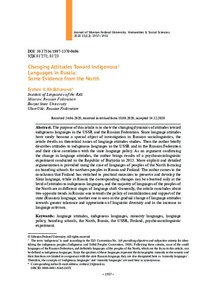Changing Attitudes Toward Indigenous1 Languages in Russia: Some Evidence from the North
Скачать файл:
URI (для ссылок/цитирований):
https://elib.sfu-kras.ru/handle/2311/137859Автор:
Khilkhanova, Erzhen V.
Хилханова, Э. В.
Дата:
2020-12Журнал:
Журнал Сибирского федерального университета. Гуманитарные науки. Journal of Siberian Federal University. Humanities & Social Sciences;2020 13 (12)Аннотация:
The purpose of this article is to show the changing dynamics of attitudes toward indigenous languages in the USSR and the Russian Federation. Since language attitudes have rarely become a special object of investigation in Russian sociolinguistics, the article dwells on theoretical issues of language attitudes studies. Then the author briefly describes attitudes to indigenous languages in the USSR and in the Russian Federation and their close correlation with the state language policy. As an argument confirming the change in language attitudes, the author brings results of a psychosociolinguistic experiment conducted in the Republic of Buryatia in 2013. More explicit and detailed argumentation is provided using the case of languages of peoples of the North focusing on boarding schools for northern peoples in Russia and Finland. The author comes to the conclusion that Finland has switched to practical measures to preserve and develop the Sámi language, while in Russia the corresponding changes can be observed only at the level of attitudes to indigenous languages, and the majority of languages of the peoples of the North are in different stages of language shift. Generally, the article concludes about two opposite trends in Russia: one towards the policy of centralization and support of the state (Russian) language, another one is seen in the gradual change of language attitudes towards greater tolerance and appreciation of linguistic diversity and in the increase in language activism Цель данной статьи – показать динамику изменений в отношении
к языкам коренных народов в СССР и Российской Федерации. Поскольку языковые установки редко становились специальным объектом исследования в российской социолингвистике, в статье рассматриваются теоретические вопросы
интерпретации и принадлежности языковых установок. Автор кратко описывает
отношение к языкам коренных народов в СССР и Российской Федерации и его
тесную связь с государственной языковой политикой. В качестве аргумента, подтверждающего изменение языковых установок, автор приводит результаты психосоциолингвистического эксперимента, проведенного в Республике Бурятия в 2013
году. Более подробно тезис о позитивной динамике в области отношения к миноритарным языкам аргументируется на примере языков народов Севера и системе
школьного образования на севере (школах-интернатах)
в России и Финляндии.
Автор приходит к выводу, что если Финляндия перешла к практическим мерам
по сохранению и развитию саамского языка, то в России соответствующие изменения можно наблюдать только на уровне отношения к языкам коренных народов,
в то время как большинство языков народов Севера находится на разных стадиях
языкового сдвига. В целом, в статье делается вывод о двух противоположных
тенденциях в России: одна направлена на политику централизации и поддержки
государственного (русского) языка, другая проявляется в постепенном изменении
языковых установок в сторону большей толерантности и признания языкового разнообразия и росте языкового активизма, направленного на защиту и продвижение языков коренных народов
Коллекции:
Метаданные:
Показать полную информациюСвязанные материалы
Показаны похожие ресурсы по названию, автору или тематике.
-
Ethnolinguistic Ecology of the Peoples of the North, Siberia and the Far East (On the Material of the Languages of the Northern Group of the Manchu-Tungus Languages)
Petrov, Alexander A.; Razumovskaya, Veronica A.; Петров, А. А.; Разумовская, В. А. (Сибирский федеральный университет. Siberian Federal University, 2019-08)The article is devoted to the problem of ethnolinguistic ecology of the indigenous peoples of the North, Siberia and the Far East — speakers of the northern group of the Manchu-Tungus languages of the Altai linguistic ... -
Ethnolinguistic Ecology of the Peoples of the North, Siberia and the Far East (On the Material of the Languages of the Northern Group of the Manchu-Tungus Languages)
Petrov, A. A.; Razumovskaya, V. A. (2019-08)The article is devoted to the problem of ethnolinguistic ecology of the indigenous peoples of the North, Siberia and the Far East — speakers of the northern group of the Manchu-Tungus languages of the Altai linguistic ... -
The Factors of British and American English Development under Globalisation
Melnichenko, Konstantin A.; Мельниченко, К.А. (Сибирский федеральный университет. Siberian Federal University., 2014-06)The paper studies the processes which arise during language contacts between the most influential varieties of the English language, British English and American English (BE and AE), and various autochthonous languages ... -
Этноязыковая ситуация Красноярского края в начале третьего тысячелетия
Фельде, О.В.; Felde, Olga V. (Сибирский федеральный университет. Siberian Federal University., 2011-07)This article presents the up-to-date view of ethno-linguistic situation in polylanguage and polycultural the Krasnoyarsk Territory. The functional typology of languages of this Siberian region has been given; historical ... -
Problems of Preserving the Kazakh Language in China: Threats of Extinction and Ways of Solution
Zharkynbekova, Sholpan K.; Tazhibayeva, Saule Zh.; Filchenko, Аndrey U.; Жаркынбекова, Ш. К.; Тажибаевa, С. Ж.; Фильченко, А. Ю. (Journal of Siberian Federal University. Сибирский федеральный университет, 2025-03)This article examines the Kazakh language spoken in China, focusing on its unique characteristics, historical development, and challenges in the context of globalization and sociolinguistic transformations. The study ...

